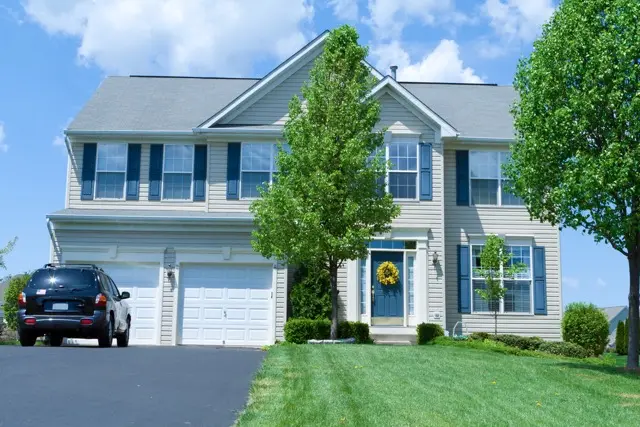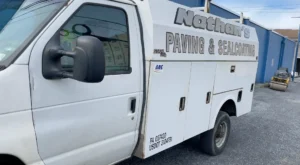Hey there! Have you ever wondered how often you should sealcoat your driveway?
Well, think of sealcoating as a protective shield for your pavement, just like sunscreen is for your skin. It helps prevent damage from harsh weather conditions and keeps your driveway looking fresh and well-maintained. Plus, it can save you money on expensive repairs or replacements down the line.
The frequency of sealcoating depends on factors like how much traffic your driveway gets and how much it’s exposed to the elements. Generally, it’s recommended to sealcoat every 2-3 years.
In this guide, we’ll explore the factors that affect sealcoating frequency, the recommended schedule, signs that indicate your driveway needs sealcoating, DIY versus professional options, and tips for maintaining long-lasting sealcoating.
Let’s get started!
Key Takeaways
- Factors affecting sealcoating frequency include driveway maintenance, cracks and holes, sunlight exposure, and freezing temperatures.
- Recommended sealcoating schedules are every two years for asphalt driveways and every five years for concrete driveways, with more frequent sealcoating needed in harsh climates or heavy traffic areas.
- Signs that your driveway needs sealcoating include cracks or faded color, and regular sealcoating helps trap oils and prevent further deterioration.
- DIY sealcoating can be cost-effective but requires time and effort, while professional services offer convenience and quality results when following recommended steps and using high-quality sealant.
How Often Should You Sealcoat Your Pavement?
The frequency of sealcoating depends on various factors, including the type of pavement, climate, and traffic. In general, it is recommended to sealcoat asphalt driveways or parking lots every 2 years. However, it’s essential to assess the condition of your pavement regularly and consider factors like cracks, fading, and wear to determine the optimal sealing schedule. If you want more of a specific answer keep reading for more details.
Factors Affecting Sealcoating Frequency
To determine how often you should sealcoat your driveway, consider several factors that can impact the frequency of sealcoating.
The first factor is driveway maintenance. Regular sealcoating helps protect your driveway from the elements and prevents asphalt deterioration.
Cracks and holes in your driveway can also affect the recommended frequency of sealcoating. If you have a lot of cracks or large holes, you may need to sealcoat more often to maintain the integrity of your driveway.
Another factor to consider is the amount of UV protection your driveway receives. Sunlight can cause the sealant to break down over time, so if your driveway is exposed to a lot of sunlight, you may need to sealcoat more frequently.
Finally, freezing temperatures can impact the longevity of your sealcoat. If you live in an area with harsh winters, the freeze-thaw cycle can cause the sealant to crack and chip, requiring more frequent sealcoating.
Recommended Sealcoating Schedule
Your driveway’s recommended sealcoating schedule depends on various factors. To help you determine the ideal frequency for sealing your driveway, consider the following:
- Type of driveway: Asphalt driveways should be sealcoated every two years, while concrete driveways can be resealed every five years.
- Climate: Harsh climates with extreme temperatures or frequent freeze-thaw cycles may require more frequent sealcoating to protect against damage.
- Traffic volume: Driveways that experience heavy traffic, such as those in commercial areas, may need to be sealcoated more often to maintain their appearance and prevent cracks.
- Expert opinion: Consult with a professional sealcoating expert who can assess your driveway’s condition and provide specific recommendations based on its unique characteristics.
- Overall condition: Regularly inspect your driveway for signs of wear or deterioration. If it appears faded or shows signs of cracking, it may be time to schedule a sealcoating application.
Signs That Your Driveway Needs Sealcoating
If you notice cracks or faded color on your driveway, it may be a sign that sealcoating is needed. Sealcoating is the process of applying a protective layer to your driveway to improve its appearance and extend its lifespan.
For asphalt driveways, it’s generally recommended to sealcoat every two years. This frequency ensures that the seal is maintained and any cracks or damage are addressed promptly. Sealcoating helps to trap oils within the asphalt, preventing them from seeping out and causing further deterioration. It also fills in smaller cracks, preventing them from becoming larger and more costly to repair.
DIY Vs Professional Sealcoating Options
When considering sealcoating options, you can choose between DIY and professional services. Here are some factors to consider:
- Cost: DIY sealcoating can be cost-effective, with the average cost for materials being $470. Professional sealcoating services can range from $173 to $707 for an average-sized driveway.
- Time and Effort: DIY driveway sealing typically takes a weekend or two to complete, involving cleaning, crack filling, and mixing the sealant. Hiring professionals can save time and hassle.
- Quality: Properly following recommended steps and using high-quality sealant is crucial for DIY sealcoating. Professionals use specially mixed sealers and have experience in delivering quality results.
- Convenience: DIY sealcoating can be done on your schedule, while professional services can be a convenient option for those with busy schedules.
- Longevity: It’s recommended to sealcoat your driveway every five years to protect it from UV rays and extend its lifespan. Professional sealcoating can ensure the job is done correctly to provide optimal protection for your driveway.
Tips for Long-lasting Sealcoating Maintenance
Wondering how to maintain your sealcoating for the long term?
To ensure a long-lasting sealcoating, it’s recommended to seal coat your driveway every 2-3 years. Regular maintenance can improve the appearance and condition of your driveway, preventing weathering, water damage, and cracks.
Before applying sealant, it’s important to inspect and repair any small cracks. For larger cracks and holes, an asphalt repair should be done before sealcoating.
Additionally, a clean base is crucial for successful sealant application. Make sure to sweep away dust, dirt, and loose debris, and power-wash the driveway to remove any hidden matter or film.
Following expert advice and using safety tools and gear during application will help ensure a long-lasting sealcoating.
These tips are applicable for both asphalt and concrete driveways.
Conclusion
In conclusion, sealcoating your driveway regularly is essential for its longevity and appearance.
Much like a coat of armor, sealcoating protects your driveway from the harsh elements and extends its lifespan, saving you money in the long run.
By following a recommended sealcoating schedule and keeping an eye out for signs of wear, you can ensure that your driveway remains well-maintained and attractive.
Consider professional sealcoating options for the best results, and remember to maintain your sealcoating for long-lasting benefits.



